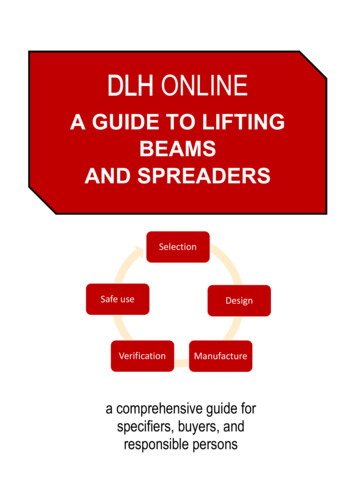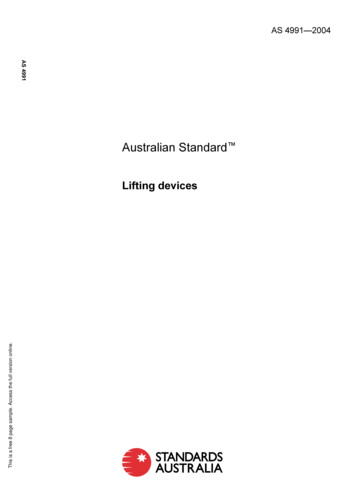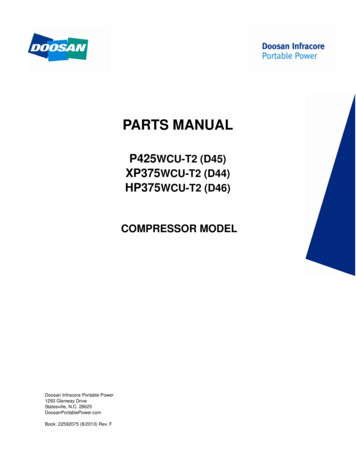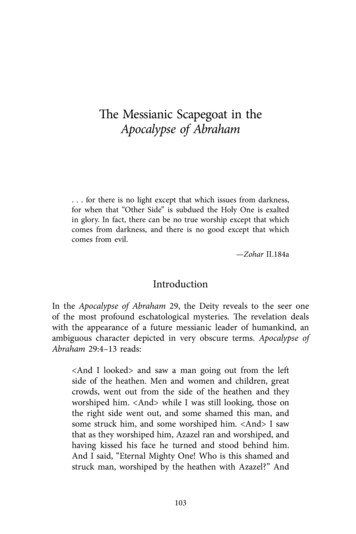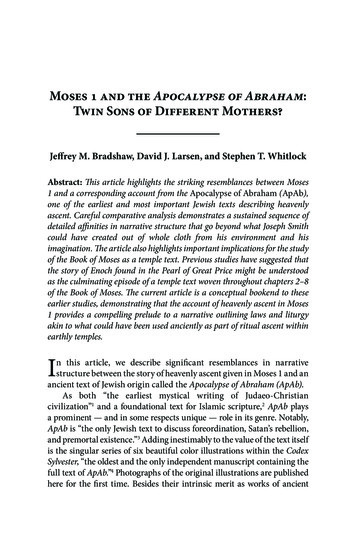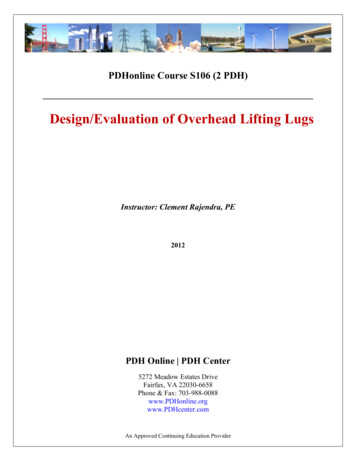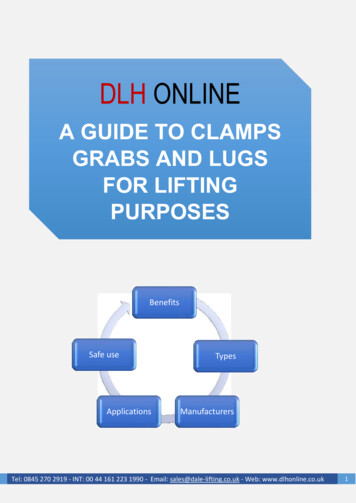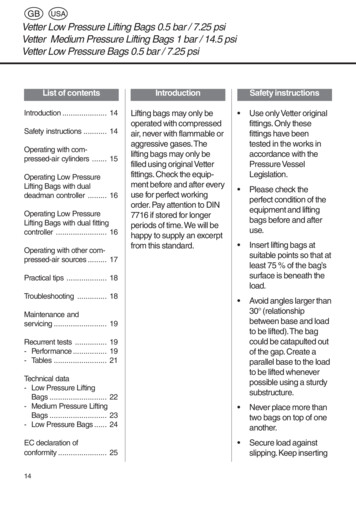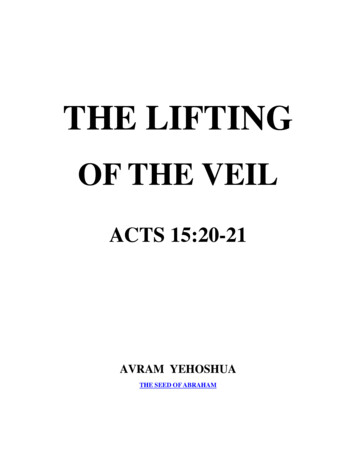
Transcription
THE LIFTINGOF THE VEILACTS 15:20-21AVRAM YEHOSHUATHE SEED OF ABRAHAM
All quotes from Unger’s Bible Dictionary are used by permission.Any material from this book may be used in publications,articles or books, etc., as long as the author is given creditand the passages are honestly presented and not taken out of context.Freely I have received this divine understanding from the Lordand so freely I share it with His Body (Matthew 10:8).First Edition 2008 by Avram YehoshuaSecond Edition 2010 by Avram YehoshuaThird Edition 2011 by Avram YehoshuaFourth Edition 2015 by Avram YehoshuaFourth Edition, First Revision 2016 by Avram YehoshuaFourth Edition, Second Revision 2018 by Avram YehoshuaFourth Edition, Third Revision 2019 by Avram YehoshuaFourth Edition, Fourth Revision 2021 by Avram Yehoshua
This book is dedicated to Messiah Yeshua, whose Spirit and Wordhave shown me the Way of Life. May its words glorify You, myLord.This book is also dedicated to my wife Ruti, whose love for Messiah Yeshua has been a Beacon Light for me in this world of Darkness. Thank you, my love!
A Veil has been placed over the eyes of my Jewish people concerning Messiah Yeshua (2nd Cor. 3:14-16).A similar Veil is over the eyes of the Bride of Christ concerningMosaic Law (Daniel 7:25).In these last days Papa God is lifting both veils, to the Glory of HisBeloved Son, Messiah Yeshua!
THE LIFTING OF THE VEILACTS 15:20-21TABLE OF CONTENTSINTRODUCTION 1THE FOUR RULES OF ACTS 15:20 8THE FIRST RULE—SACRIFICIAL MEAT 15THE SECOND RULE—CULT PROSTITUTION 18The Hebrew Noun Zinute (Prostitution) 21The Hebrew Verb Zanah (to Prostitute) 24The Hebrew Participle Zonah (Prostitute) 28Schematic on Harlotry in the Old Testament 29JUDAH AND TAMAR 32ISRAEL AND BAAL PEOR 34CULT PROSTITUTION IN ANCIENT ISRAEL 39CULT PROSTITUTION IN THE ANCIENT WORLD 46THE GREEK PERSPECTIVE ON THE SECOND RULE 54The Greek Noun Pornay’ah (Prostitution) 58The Greek Verb Pornu’oh (to Prostitute) 62The Greek Noun Pornay (Prostitute) 63CULT PROSTITUTION IN THE NEW TESTAMENT 65Fornication—Cult Prostitution 65Fornications 68Fornicator 68Fornicators 69Schematic on Harlotry in the New Testament 70SCHOLARSHIP AND THE SECOND RULE 72Popular Definitions of Fornication 75JESUS AND DIVORCE 77CULT PROSTITUTION IN THE CORINTHIAN ASSEMBLY 86Incest in Corinth: 1st Cor. 5:1-5 88Cult Prostitution in Corinth: 1st Cor. 6:12-20 90More Cult Prostitution in Corinth: 1st Cor. 10 97Fellowship with Devils: 1st Cor. 10:16-22 102
Beef in the Market: 1st Cor. 10:23-28 104CULT PROSTITUTION IN REVELATION 107THE THIRD RULE—THINGS STRANGLED 112THE FOURTH RULE—BLOOD 116ACTS 15—SOME CONCERNS 122Acts 15:10—The Yoke 122Acts 15:19—Don’t Trouble Them! 135Acts 15:21—Go to the Synagogue?! 138Acts 15:21—The Preachers of Moses 150Acts 21:25—Observe No Such Thing! 157Acts 15:20, 29; 21:25—Switched Rules 166THE CONCERN OF JAMES 168Table Fellowship 168Various Interpretations of Four Rules of Acts 15:20 168Noah and Acts 15:20 181Sacrificial-Sexual Idolatry 184Conclusion 189IS ACTS RELIABLE? 192REALITY RAMIFICATIONS 198A Word about Torah 199An Insight 200Some Advice 203APPENDIX 206Two Different Kingdoms? The Stranger and the Native-Born 206The Blood 209The Harlot 210The Fire of God 212The Fire of Paganism 213Paganism 214BIBLIOGRAPHY 219Internet Sites 222Contact Information 231
AbbreviationsALGNT Analytical Lexicon of the Greek New TestamentAHCL The Analytical Hebrew and Chaldee LexiconARA A Rabbinic AnthologyASV American Standard Version (Bible)CED Collins English DictionaryDBI Dictionary of Biblical ImageryGELNT A Greek-English Lexicon of the New TestamentGELNTS Greek-English Lexicon of the New Testament: Semitic DomainsHALOT The Hebrew and Aramaic Lexicon of the Old TestamentIBD The Illustrated Bible DictionaryISBE The International Standard Bible EncyclopediaJNTC Jewish New Testament CommentaryKJV King James Version (Bible)NAGL The New Analytical Greek LexiconNASB New American Standard BibleNBDBG The New Brown, Driver, Briggs, Gesenius Hebrew and English LexiconNGEINT The New Greek-English Interlinear New TestamentNIV New International Version (Bible)NKJV New King James Version (Bible)NRSV New Revised Standard Version (Bible)NU Nestle–Aland Greek New Testament–United Bible Societies third corrected ed.TALGNT The Analytical Lexicon to the Greek New TestamentTGELNT Thayer’s Greek-English Lexicon of the New TestamentTDNT Theological Dictionary of the New TestamentTDOT Theological Dictionary of the Old TestamentTLOT Theological Lexicon of the Old TestamentTWOT Theological Wordbook of the Old TestamentUBD Unger’s Bible DictionaryWBC The Wycliffe Bible CommentaryWNCD Webster’s New Collegiate Dictionary
AcknowledgementsI am indebted to my wife, Ruti Yehoshua, for her proofreading of the original manuscriptand her keen insights, but also for ‘showing me the Way’ when my carnal nature led mein the other way.I also want to thank Yakov Snyder for bringing a number of my typographical errors tomy attention, and for being a gift to His Body and to me. Yakov’s ability ‘to see’ whatmost Christians refuse to see, and to make them his own, continually astounds me. Hisgift is unique, in realizing the anti-Mosaic Law theological position is not of MessiahYeshua, and that walking out his faith in Yeshua through all the rules of Mosaic Law iswhat His Lord wants. He is not only able to see this, but his insights and understandingbuild upon it. He is a teacher of God’s Word.This fourth revision of the third edition is online and has been fully revised and rearranged for better comprehension. It’s also formatted to standard letter size paper so thatanyone can print it. Please feel free to read and/or download and/or print out this book. Itis a Gift from Above to the Body of Messiah Yeshua.May the Lord Yeshua bless you as you read, The Lifting of the Veil—Acts 15:20-21,Avram YehoshuaFlagstaff, Arizona USAThis fourth revision was finished on Sunday, November 15th, 2020and last revised on Wednesday, December 15, 2021.
INTRODUCTIONAlexander Hislop, in his Christian classic, The Two Babylons, acknowledges his indebtedness to LordJohn Scott, who had died three years earlier, saying about Mr. Scott that,“His religion was no sentimental religion; his fear of God was not taught by the commandment of men. His faith was drawn directly from the inspired fountain of divine truth.From the time that the claims of God to his heart had laid hold on him, the Word of Godbecame his grand study, and few men have I ever known who held with a more firm andtenacious grasp the great truth that the Word of God, and that Word alone, is the light andrule for the guidance of Christians, and that every departure from that Word, alike on thepart of Churches and individuals, implies, as he himself expressed it, ‘going off the rails,’and consequently, danger of the highest kind.”1How true that is. The Word of God is the Light and rule for guiding Christians and every departure from itentails ‘going off the rails.’ Obviously, some departures may not be as significant as others, but The Lifting of the Veil reveals that Christians, have been derailed for 1,900 years. How to walk out one’s faith inJesus of Nazareth is almost as important as being Born Again. This satanic derailment that Christianswillingly walk in, and I don’t use that adjective lightly, makes the ancient Pharisees who confronted andvilified Jesus over His Scripture interpretation, pale in significance—so great is Christian departure fromGod’s Word. Make no mistake about it—the Pharisees thought they understood Scripture better than theLord of Scripture, and most Christians today think the very same thing in the area under scrutiny.The Lifting of the Veil reveals the Lord’s alternative to the Church’s convoluted and heretical interpretation of Acts 15:20-21. These two verses of New Testament Scripture form the biblical foundation that reveals God’s will for how every Christian is to walk out their faith in Jesus. This understanding goesagainst the massive theological superstructure of Church tradition concerning Mosaic Law and dismantlesit, revealing the sinking sand upon which it was built. The arrogance, ignorance and darkness that ourLord faced when the Pharisees confronted Him over His understanding of Scripture and Sabbath has itsparallel in how Christians try and justify their position on illicit SEX, which is an acronym for Sunday,Easter and Xmas, which also entails the eating of unclean animals and a self-righteous contempt for Mosaic Law, whose rules Jesus not only lived by, but which were the very standard that judged Him sinless.The Church, interpreting the four rules of James (Acts 15:20) as table fellowship, completely missesGod’s point. The four rules form a conceptual unit on sacrificial-sexual idolatry and were meant to dealwith continued Gentile worship of their gods as Christians. James, the oldest half-brother of Jesus and theleader of the Council of Acts 15, was concerned that Gentile Christians would just ‘add’ Jesus to theirpantheon of gods, and consequently, they would continue to believe in and worship Diana and Zeus, etc.,along with Jesus. The concern of James was well founded (cf. 1st Thess. 1:6-10; Rev. 2:14-16, 20).The four rules of James acted as a spiritual filter revealing whether Gentile faith in Jesus was genuine ornot, because Jesus doesn’t countenance any rivals. These four rules were the first of many Mosaic rules orlaws, and not ‘the only rules’ that the Gentiles were expected to observe, as the Church teaches. The fourrules were given because of their primary importance specifically in relation to Gentile salvation, which iswhy the Council of Acts 15 met (Acts 15:1-5f.). The four rules have nothing to do with Table Fellowship,as the Church currently teaches.Only 18 years after the resurrection (48 AD), Acts 15:20 forms the New Testament’s theological founda1Alexander Hislop, The Two Babylons, 2nd American edition (Neptune, NJ: Loizeaux Brothers, 1959), p. xiii. Itcan be read at The Two Babylons—The Full Hislop, where the quote is on pp. xiv-xv.
THE LIFTING OF THE VEIL—ACTS 15:20-21tion that reveals Mosaic Law valid for all Christians, not the least of which is because James speaks of theGentile Christians, on the Sabbath day learning Moses (i.e. Mosaic Law);“For Moses has had throughout many generations those who preach him in every city,being read in the synagogues every Sabbath.” (Acts 15:21)Church theology teaches that at the crucifixion of Jesus, Mosaic Law ‘was canceled,’ but James, speakingof the Sabbath and ‘Moses,’ seems to disagree.2 Christians do not have authority from God (His New Testament Word) to keep Sunday, Easter (or the more fashionable ‘Resurrection Sunday’) nor Xmas, nor dothey have God’s blessing to eat unclean foods such as ham, bacon, shrimp, catfish or lobster if they prayover those foods. If they did, Scripture would simply declare that Sunday replaced the 7th day Sabbath,and one can eat the meat of formerly unclean animals, but look as you may you’ll never find that. Yes,there are some texts that Christians misinterpret to justify the eating of unclean animals (e.g. Acts 10), butthey evaporate into thin air when the Word of God is properly understood. The Pharisees had their teachings that nullified God’s Word (Mt. 15:1-9) and they had Scripture proof texts to support their heresiesalso. As Solomon once penned, ‘There is nothing new under the sun’ (Eccl. 1:9c). What the Pharisees haddone to God’s Word in the time of Jesus, the Church has not only emulated, but greatly superseded.The Book of Acts is the only divinely inspired history of the early Church (30-64 AD). It forms a bridgebetween the Gospels and the Letters of Peter and Paul, etc. Without Acts we wouldn’t know what happened in Jerusalem after the resurrection, with the subsequent giving of the Holy Spirit on Pentecost. Wewouldn’t know of the many thousands of Jewish people who came to believe in Yeshua3 (the Hebrewname for Jesus), and we wouldn’t realize what Peter, Stephen or Philip did, nor what happened to Paul onthe Road to Damascus. We also wouldn’t know anything about how the question of Gentile salvation andthe Law of Moses was settled in Acts 15, whose proper interpretation is of vital importance for us today.Salvation is based on biblical faith in Yeshua plus nothing else. There’s no law or good deed that anyonecan do ‘to save himself.’ Only the sacrificial blood of Yeshua can transform our nature into His nature. It’scalled being Born Again (John 3:3, 5). The keeping of Mosaic Law could never give anyone eternal lifenor was it ever designed by God to so. Justification by faith is the incredibly gracious work of the Fatherthrough His Son vai the Holy Spirit for forgiveness of sins, transformation of being and glorification.The Church (collectively consisting of all organized Christian churches) teaches that Mosaic Law wasnullified by the sacrificial death of Jesus Christ. The Feasts of Israel, the dietary laws and the 7th day Sabbath, to name three of the five major Pillars of the Law, are ‘only for the Jews who rejected Jesus’ andwho are still ‘under the Law.’ Christians are ‘under Grace’ and free from the Law, or as F. F. Bruce writes,Christianity is a ‘law-free gospel.’4 Acts 15 is used by the Church to prove that theology. James rightlynullified the Pharisaic Christian position (Acts 15:1, 5, 13f.) that Gentile Christians needed to be physically (covenantally) circumcised and keep the Law, along with their faith in Yeshua, in order to be saved.The Church supports its teaching of a ‘law-free Gospel’ based on its misinterpretation of Peter’s yoke234For other places where the Sabbath is seen after the resurrection, see Acts 13:42, 44; 16:13; 17:2; 18:4; cf. Col.2:16; Heb. 4:9. For the biblical evidence that neither the Sabbath nor the Feasts of Israel nor Mosaic Law werecancelled for Christians, see the one page article, The Feasts of Israel and the Church and its bigger brother, TheFeasts of Israel as Time Markers After the Resurrection.Places in Acts where (many) Jews believed (or came to believe) in Yeshua are Acts 2:41 (3,000 men), 47; 4:4(5,000 men total); 5:14; 6:1, 7; 9:31, 35, 42; 13:43; 14:1; 17:1-4, 10-12; 18:4, 8, 19-21; 21:20.F. F. Bruce, Author; Gordon D. Fee, General Editor, The New International Commentary on the New Testament:The Book of the Acts (Grand Rapids, MI: William B. Eerdmans Publishing Company, 1988), p. 285.2
Introduction(Acts 15:10), and the four rules of James that follow his decision (Acts 15:20). Theologians teach that therules apply to table fellowship and that these are the only rules or laws for Christians, other than the morallaws of Mosaic Law. Their anti-Law theology5 blinds them to the biblical interpretation of Acts 15:20.This in turn sets up their inability to correctly understand the meaning of the next verse (v. 21), whereJames speaks of the Law of Moses being taught in the synagogues every Sabbath day for the Gentile.F. F. Bruce describes Acts 15 as ‘epoch-making,’6 and I. Howard Marshall agrees with him. Marshall believes Acts 15 is theologically important because,‘Luke’s account of the discussion regarding the relation of the Gentiles to the law ofMoses forms the center of Acts both structurally and theologically.’7Bruce and Marshall are right about the tremendous importance of Acts 15, but they fail to understand itsproper meaning and implication. The words of James in Acts 15:20-21 are nothing less than the fulcrumpoint declaring Mosaic Law for every Christian, and it’s at this crucial juncture that the Church creates atheological veil so thick that it has kept Christians from seeing their ancient Hebraic heritage—how theFather wants them to actually walk out their faith in His Son. This failure, in turn, has led the Church intopagan days and pagan ways ‘in the Name of Jesus,’ which neither Yeshua nor Paul ever intended.Almost two thousand years ago, in 48 AD, all the Jewish Christian Apostles and Elders in Jerusalem assembled to discuss the matter of Gentile salvation in Jesus (Acts 15:1-6). They needed to know exactlywhat constituted salvation (justification) for the Gentile. Paul, Barnabas and others from the congregationin Antioch were also there that day. The Jewish Christian leadership in Antioch had requested a ruling:8“Some men came down from Judah and began teaching the brethren, ‘Unless you arecircumcised according to the custom of Moses you cannot be saved.’ And when Paul andBarnabas had great dissension and debate with them, the brethren determined that Pauland Barnabas, and some others of them, should go up to Jerusalem to the Apostles andElders concerning this issue.”9Those Pharisaic Christians from Judah wanted the Gentiles to be physically, covenantally circumcised,which was seen at the time as a way of becoming part of saved Israel (to become a Jew),10 but more to the5678910Church theology on the Law has been superficially challenged in the last 45 years by E. P. Sanders (Paul andPalestinian Judaism; 1977), James Dunn (The Theology of Paul the Apostle; 1998) and N. T. Wright (Paul: InFresh Perspective; 2005). Equating Mosaic Law with legalism is finally being seen as a perversion and caricature of God’s holy Law (Rom. 3:31; 7:7, 12, 14), but this has not led Christians to keep it.Bruce, The Book of the Acts, p. 282.I. Howard Marshall, M.A., B.D., Ph.D., Author; Professor R.V.G. Tasker, M.A., B.D., General Editor, TyndaleNew Testament Commentaries: Acts (Leicester, England: Inter-Varsity Press, 2000), p. 242.Antioch (on the Orontes River) was 300 miles (482 kilometers) north of Jerusalem. It had a population of500,000 of which 70,000 were Jews. Josephus ranked it as ‘the third greatest (largest in population) city of theRoman Empire, behind Rome and Alexandria’ (Josephus, Jewish Wars, 3.29).Most Scripture quotes are taken from the New American Standard Bible or the New King James Version.Changes have been made to texts where The Hebraic Perspective (translation) is more suitable. Unless otherwisestated, italics are my way of emphasizing a word or a phrase, while proper nouns are capitalized (e.g. Aaron theHigh Priest, the Law, and the Temple, etc.) and also, the Name of the God of Israel (Yahveh) is written as such,instead of the generic term, ‘the LORD.’Becoming a proselyte meant that the Gentile was ‘now a Jew,’ but it’s an unbiblical and false concept of Rabbinic Judaism. Nowhere in the Old Testament does God ever say that a Gentile becomes a Jew. The Gentile who‘came alongside’ Israel was certainly part of Israel and one with Her, so much so that God speaks of there being3
THE LIFTING OF THE VEIL—ACTS 15:20-21point, it meant keeping Mosaic Law for eternal life (symbolized in physical, covenantal circumcision;Gen. 17:10-14; cf. Acts 15:5),11 which was how the Jewish people thought they got to Heaven before Jesus came. It was a Pharisaic teaching and it was wrong. God never gave Mosaic Law for eternal life.In the aftermath of the decision by James in which he struck down the false teaching that eternal lifehinged upon Law keeping, symbolized in physical, biblical circumcision, four rules were issued (v. 20).Biblical understanding of them is critical in realizing what James meant and what the Council ratified, andtherefore, what God through them intended for the Gentile Christians after they had entered into theKingdom of Messiah Yeshua.What the Holy Spirit issued through James for the Gentile was conceptually no different from what Godhad done for Israel through Moses when He brought Israel out of Egyptian slavery. The Hebrews were notsaved by circumcision nor the Law, but by the blood of the lamb and their faith in Moses (Ex. 12),12 thegreatest Old Testament type of Yeshua. It follows then that the Gentile wouldn’t be saved by circumcisionor the Law, either. After Hebrew deliverance (salvation) from Egypt, Yahveh13 brought Israel to Mt. Sinaito learn His ways—who was this God that had just brought Egypt, the mightiest nation in the world atthat time, to its knees? What did He require? What was pleasing and right in His eyes? God’s holyStandard has not been nullified by the sacrificial death of His Son, as the Church teaches.God didn’t set Israel free to do her own thing, willing to accept whatever any Hebrew thought was ‘rightin his heart.’ He gave Israel His holy and spiritual Law (Dt. 4:5-8; Rom. 7:12, 14) so that she would knowright from wrong. It’s not different ‘in Christ.’ After all, why would God’s spiritual rules be invalid for theGentile Christian in the Jewish Messiah? Some might say, ‘The only thing we need to do is to love Godand our neighbor.’ That’s very true, and this is the heart of the Law (Dt. 6:4-5; Lev. 19:18), but how doesGod define love? The Lord Yeshua declared that all the commandments and rules of Mosaic Law areGod’s definition of how to love God and our neighbor (Mt. 22:35-40). In other words, without MosaicLaw a Christian is ignorant of how God sees “love.”Some say, ‘We don’t need the Law. We have the Holy Spirit to guide us in God’s will,’ yet the Corinthians, who ‘came behind no one’ in terms of the Spirit (1st Cor. 1:3-7), were continually being rebuked andremonstrated by Paul because they needed to be taught the Way (Word) of God. We wouldn’t have mostof the letters of Paul if we ‘only needed the Spirit.’ It’s the Spirit and the Word of God we need, and it’s111213‘one law for the stranger and the native born’ (the Hebrew Israeli). This ‘stranger’ is specifically called a ger גֶר in Scripture and is very different from other ‘strangers’ (Gentiles). See the differences in the Appendix, TheStranger and the Native-Born, beginning on page 206.The male Gentile believer must not be physically, covenantally circumcised in order ‘to keep Passover,’ or Mosaic Law, as many in the so-called Hebrew Roots Movement teach. It’s a heresy of the highest order. See GentileCircumcision?Alfred Edersheim, The Temple: Its Ministry and Services (Peabody, MA: Hendrickson Publishers, 1994), pp.183-184. Edersheim writes that the sacrifice of the Passover lamb in Egypt was a picture of the sacrifice of Jesus.No other sacrifice ‘could so suitably commemorate His death, nor yet the great deliverance connected with it,and the great union and fellowship from it.’ It ‘had been instituted and observed before Levitical sacrifices existed; before the Law was given; nay, before the Covenant was ratified by blood (Ex. 24). In a sense, it may besaid to have been the cause of all the later sacrifices of the law and of the Covenant itself.’The Jew was not saved from Egyptian slavery by either circumcision or the Law, but by the blood of the lamb,which was the grace of Yahveh to Israel, the prototype of the Lamb of God.The personal name of the God of Israel is יהוה Yahveh. It’s found 6,823 times in the Old Testament. Using ‘theLORD’ covers over and negates the personal name of the God of Israel, which He wants His people to know.4
Introductionthe express purpose of the Holy Spirit to write Mosaic Law upon the heart of every Christian (Jer. 31:33;Ezk. 36:26-27; Heb. 8:10; 10:16). If the Law is truly written on a Christian’s heart, wouldn’t he want tokeep God’s Passover and His 7th day Sabbath holy just as Jesus did? Isn’t Jesus our Example in all matters of faith and practice? Where does Jesus, Peter or Paul tell us to observe Sunday, Easter or Xmas?In the days of the Apostles the Gentile Christians learned Mosaic Law and were part of Israel (Jn. 10:16;Rom. 11:24; 1st Cor. 7:17-19; Eph. 2:13). It wasn’t Church vs Israel—it was Church within Israel as theIsrael of God. The Gentile Christian learned Mosaic Law by going to either the unbelieving synagogue orthe Christian synagogue (cf. Jam. 2:2) on the Sabbath day (Acts 15:21). Mosaic Law taught him his newFamily Rules and History so that he might walk in those rules in the power and love of the Holy Spirit,just as all the Apostles and Jewish Christians did after the resurrection (cf. Acts 21:20; 55 AD).The Lord Jesus uses the expression Born Again (or Born from Above, Jn. 3:3, 7) to indicate one’s birth orentry into His Kingdom. An infant is born into a family without keeping any of the family rules ‘by thegrace of the parents.’ Does this mean that the child will not be required to keep the family rules as itgrows up? Does it matter if the child obeys his father? Or should the will of the child overrule the father’swill and change the family values? Knowing the will of our Father in Heaven and obeying them is centralto being a son or daughter of God. Yeshua said in Matthew 7:21:‘Not everyone who says to Me, ‘Lord, Lord,’ will enter the Kingdom of Heaven, but hewho does the will of My Father in Heaven will enter.’ (cf. Mt. 12:50)What is the will of God in relation to Mosaic Law? Many in the Church say, ‘The Law has been doneaway with,’ yet Marshall, before he theologizes the Law away, says that Mosaic Law is the will of God:What ‘evidence was there that the law, which represented the will of God for his covenantpeople, had been repealed?’14God gave those rules to Israel after He had saved them from Egyptian slavery. The same concept holdstrue for the Christian today. Once saved, once ‘in’ the Kingdom of Yeshua, Mosaic Law becomes the divine guideline or Standard for how each Christian is to walk out their faith in Christ. Mosaic Law revealswhat is sin and what is right in God’s eyes (cf. Rom. 3:20).Messiah Yeshua said that love was the basis for all the laws of Moses (Mt. 22:40), so Christians keep theessence of the will of God. Unfortunately, the organized churches teach against everything in the Law except what they perceive to be its moral laws. Therefore, Christians are ignorant of the specifics of God’sLaw and are horrified to even consider them. The mere mention of Mosaic Law, as part of God’s will,brings puzzled looks, fear and/or contempt to the faces of most who, in their pride and ignorance think itdoesn’t apply to them. Those same facial expressions were also seen on the Pharisees, who boasted oftheir own (false) interpretations of God’s Word (Lk. 18:9-14; Mt. 15:1-20), while rejecting the understanding of the Word of God who stood right before them.On the other hand, some extremists in the Law Camp say that Christians who don’t keep the 7th day Sabbath are going to Hell. This, too, is wrong. Anyone who loves Jesus and his neighbor is keeping the heartof the Law in the Light that he has (Dt. 6:4-5; Lev. 19:18; Lk. 10:25-28). Those extremists fail to realizethat even if someone is keeping Sunday and eating ham, if he has a living relationship with Jesus he willbe forgiven of those sins (1st Pet. 4:8). Yeshua’s sacrifice is that great (Acts 13:38-39), but a Christianwalking in those sins is not what Jesus wants for him. Committing those sins has its negative effect uponthe Christian, as well as on others. Walking like Jesus walked should be a divine goal of every Christian.14Marshall, Acts, p. 242.5
THE LIFTING OF THE VEIL—ACTS 15:20-21Of course, there are Christians who hear that eating pig won’t send them to Hell, so they’re not concernedabout the Law, but sinning against God is no light matter. Building a theological house on sand is muchmore disastrous than building a real house on it (Mt. 7:24-27). Reading into Acts 15, and other passagesof the New Testament, that Mosaic Law has been done away with is a false interpretation of the text/s,and false theology leads to perverse and sinful lifestyles. This distorts the picture of the true Jesus thatgodly Christians want to emulate and present to others.This false picture also offends the Jewish people who understand, and rightly so, that their Messiah wouldnever do away with Mosaic Law, and isn’t that exactly what Jesus says in Mt. 5:17? Jews know that theGod of Israel gave His laws and statutes to Moses. God Himself warns them in the Law that if anyoneentices them to follow ‘another god,’ they’re to be stoned to death (Dt. 13:1-5; 17:2-13). At this point, a‘Jesus (or a Paul) who has done away with the Law’ becomes a salvation issue for the entire Jewish community. Placing this stumbling block in their way is nothing less than diabolical (cf. Acts 20:27-31).Most Israelis are taught in grade school that Jesus started another religion—Christianity. It hates the Jewish people and Mosaic Law. Is that really what Jesus did? It certainly can’t be found in His words
All quotes from Unger’s Bible Dictionary are used by permission. Any material from this book may be used in publications, articles or books, etc., as long as the author is given credit and the pass

